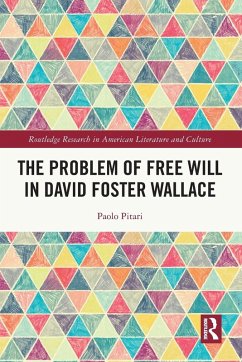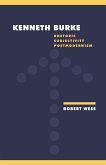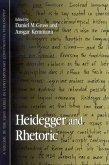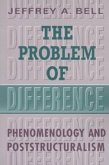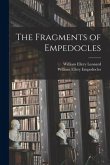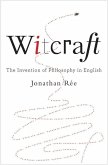Paolo Pitari
The Problem of Free Will in David Foster Wallace
Paolo Pitari
The Problem of Free Will in David Foster Wallace
- Broschiertes Buch
- Merkliste
- Auf die Merkliste
- Bewerten Bewerten
- Teilen
- Produkt teilen
- Produkterinnerung
- Produkterinnerung
This book argues that David Foster Wallace failed to provide a response to the existential predicament of our time. Wallace wanted to confront despair through art, but he remained trapped, and his entrapment originates in the 'existentialist contradiction
Andere Kunden interessierten sich auch für
![Kenneth Burke Kenneth Burke]() Robert WessKenneth Burke42,99 €
Robert WessKenneth Burke42,99 €![Heidegger and Rhetoric Heidegger and Rhetoric]() Heidegger and Rhetoric33,99 €
Heidegger and Rhetoric33,99 €![The Problem of Difference The Problem of Difference]() Jeffrey BellThe Problem of Difference50,99 €
Jeffrey BellThe Problem of Difference50,99 €![Of Derrida Heidegger and Spirit Of Derrida Heidegger and Spirit]() David WoodOf Derrida Heidegger and Spirit28,99 €
David WoodOf Derrida Heidegger and Spirit28,99 €![Thinking with Heidegger Thinking with Heidegger]() Miguel De BeisteguiThinking with Heidegger20,99 €
Miguel De BeisteguiThinking with Heidegger20,99 €![The Fragments of Empedocles The Fragments of Empedocles]() William Ellery LeonardThe Fragments of Empedocles17,99 €
William Ellery LeonardThe Fragments of Empedocles17,99 €![Witcraft Witcraft]() Jonathan RéeWitcraft22,99 €
Jonathan RéeWitcraft22,99 €-
-
-
This book argues that David Foster Wallace failed to provide a response to the existential predicament of our time. Wallace wanted to confront despair through art, but he remained trapped, and his entrapment originates in the 'existentialist contradiction
Produktdetails
- Produktdetails
- Verlag: Routledge
- Seitenzahl: 298
- Erscheinungstermin: 28. November 2025
- Englisch
- Abmessung: 229mm x 152mm x 16mm
- Gewicht: 435g
- ISBN-13: 9781032676692
- ISBN-10: 1032676698
- Artikelnr.: 75669708
- Herstellerkennzeichnung
- Libri GmbH
- Europaallee 1
- 36244 Bad Hersfeld
- gpsr@libri.de
- Verlag: Routledge
- Seitenzahl: 298
- Erscheinungstermin: 28. November 2025
- Englisch
- Abmessung: 229mm x 152mm x 16mm
- Gewicht: 435g
- ISBN-13: 9781032676692
- ISBN-10: 1032676698
- Artikelnr.: 75669708
- Herstellerkennzeichnung
- Libri GmbH
- Europaallee 1
- 36244 Bad Hersfeld
- gpsr@libri.de
Paolo Pitari completed a joint PhD in English at the Ca' Foscari University of Venice and at LMU Munich. He is the author of numerous academic articles in literature and philosophy. This research was funded by the University of Venice, the JFK Institute of Freie Universität Berlin, and the DAAD.
Preface: The problem of free will
Introduction: The problem of free will in David Foster Wallace
Part one: Literary truth according to David Foster Wallace
Chapter 1: The influence of Leo Tolstoy's What Is Art? on David Foster
Wallace's literary project
Chapter 2: The influence of Jean-Paul Sartre's "What Is Literature?" on
David Foster Wallace's literary project
Part two: The problem of free will in David Foster Wallace's literary
sociology
Chapter 3: The system of David Foster Wallace's literary sociology
Chapter 4: On narcissism: David Foster Wallace and Christopher Lasch
Chapter 5: On morality and the absurd: David Foster Wallace and Zygmunt
Bauman
Chapter 6: On existentialism and capitalism: David Foster Wallace and
Ulrich and Elisabeth Beck
Chapter 7: On ontological insecurity: David Foster Wallace and Anthony
Giddens
Part three: The problem of free will in David Foster Wallace's fiction: A
comparative reading of Fyodor Dostoevsky and David Foster Wallace
Chapter 8: A critical history of the philosophical criticism on Fyodor
Dostoevsky and David Foster Wallace
Chapter 9: Fyodor Dostoevsky, Mikhail Bakhtin, and David Foster Wallace:
United in existentialism
Chapter 10: The problem of free will in Crime and Punishment and The Pale
King
Bibliography
Index
Introduction: The problem of free will in David Foster Wallace
Part one: Literary truth according to David Foster Wallace
Chapter 1: The influence of Leo Tolstoy's What Is Art? on David Foster
Wallace's literary project
Chapter 2: The influence of Jean-Paul Sartre's "What Is Literature?" on
David Foster Wallace's literary project
Part two: The problem of free will in David Foster Wallace's literary
sociology
Chapter 3: The system of David Foster Wallace's literary sociology
Chapter 4: On narcissism: David Foster Wallace and Christopher Lasch
Chapter 5: On morality and the absurd: David Foster Wallace and Zygmunt
Bauman
Chapter 6: On existentialism and capitalism: David Foster Wallace and
Ulrich and Elisabeth Beck
Chapter 7: On ontological insecurity: David Foster Wallace and Anthony
Giddens
Part three: The problem of free will in David Foster Wallace's fiction: A
comparative reading of Fyodor Dostoevsky and David Foster Wallace
Chapter 8: A critical history of the philosophical criticism on Fyodor
Dostoevsky and David Foster Wallace
Chapter 9: Fyodor Dostoevsky, Mikhail Bakhtin, and David Foster Wallace:
United in existentialism
Chapter 10: The problem of free will in Crime and Punishment and The Pale
King
Bibliography
Index
Preface: The problem of free will
Introduction: The problem of free will in David Foster Wallace
Part one: Literary truth according to David Foster Wallace
Chapter 1: The influence of Leo Tolstoy's What Is Art? on David Foster Wallace's literary project
Chapter 2: The influence of Jean-Paul Sartre's "What Is Literature?" on David Foster Wallace's literary project
Part two: The problem of free will in David Foster Wallace's literary sociology
Chapter 3: The system of David Foster Wallace's literary sociology
Chapter 4: On narcissism: David Foster Wallace and Christopher Lasch
Chapter 5: On morality and the absurd: David Foster Wallace and Zygmunt Bauman
Chapter 6: On existentialism and capitalism: David Foster Wallace and Ulrich and Elisabeth Beck
Chapter 7: On ontological insecurity: David Foster Wallace and Anthony Giddens
Part three: The problem of free will in David Foster Wallace's fiction: A comparative reading of Fyodor Dostoevsky and David Foster Wallace
Chapter 8: A critical history of the philosophical criticism on Fyodor Dostoevsky and David Foster Wallace
Chapter 9: Fyodor Dostoevsky, Mikhail Bakhtin, and David Foster Wallace: United in existentialism
Chapter 10: The problem of free will in Crime and Punishment and The Pale King
Bibliography
Index
Introduction: The problem of free will in David Foster Wallace
Part one: Literary truth according to David Foster Wallace
Chapter 1: The influence of Leo Tolstoy's What Is Art? on David Foster Wallace's literary project
Chapter 2: The influence of Jean-Paul Sartre's "What Is Literature?" on David Foster Wallace's literary project
Part two: The problem of free will in David Foster Wallace's literary sociology
Chapter 3: The system of David Foster Wallace's literary sociology
Chapter 4: On narcissism: David Foster Wallace and Christopher Lasch
Chapter 5: On morality and the absurd: David Foster Wallace and Zygmunt Bauman
Chapter 6: On existentialism and capitalism: David Foster Wallace and Ulrich and Elisabeth Beck
Chapter 7: On ontological insecurity: David Foster Wallace and Anthony Giddens
Part three: The problem of free will in David Foster Wallace's fiction: A comparative reading of Fyodor Dostoevsky and David Foster Wallace
Chapter 8: A critical history of the philosophical criticism on Fyodor Dostoevsky and David Foster Wallace
Chapter 9: Fyodor Dostoevsky, Mikhail Bakhtin, and David Foster Wallace: United in existentialism
Chapter 10: The problem of free will in Crime and Punishment and The Pale King
Bibliography
Index
Preface: The problem of free will
Introduction: The problem of free will in David Foster Wallace
Part one: Literary truth according to David Foster Wallace
Chapter 1: The influence of Leo Tolstoy's What Is Art? on David Foster
Wallace's literary project
Chapter 2: The influence of Jean-Paul Sartre's "What Is Literature?" on
David Foster Wallace's literary project
Part two: The problem of free will in David Foster Wallace's literary
sociology
Chapter 3: The system of David Foster Wallace's literary sociology
Chapter 4: On narcissism: David Foster Wallace and Christopher Lasch
Chapter 5: On morality and the absurd: David Foster Wallace and Zygmunt
Bauman
Chapter 6: On existentialism and capitalism: David Foster Wallace and
Ulrich and Elisabeth Beck
Chapter 7: On ontological insecurity: David Foster Wallace and Anthony
Giddens
Part three: The problem of free will in David Foster Wallace's fiction: A
comparative reading of Fyodor Dostoevsky and David Foster Wallace
Chapter 8: A critical history of the philosophical criticism on Fyodor
Dostoevsky and David Foster Wallace
Chapter 9: Fyodor Dostoevsky, Mikhail Bakhtin, and David Foster Wallace:
United in existentialism
Chapter 10: The problem of free will in Crime and Punishment and The Pale
King
Bibliography
Index
Introduction: The problem of free will in David Foster Wallace
Part one: Literary truth according to David Foster Wallace
Chapter 1: The influence of Leo Tolstoy's What Is Art? on David Foster
Wallace's literary project
Chapter 2: The influence of Jean-Paul Sartre's "What Is Literature?" on
David Foster Wallace's literary project
Part two: The problem of free will in David Foster Wallace's literary
sociology
Chapter 3: The system of David Foster Wallace's literary sociology
Chapter 4: On narcissism: David Foster Wallace and Christopher Lasch
Chapter 5: On morality and the absurd: David Foster Wallace and Zygmunt
Bauman
Chapter 6: On existentialism and capitalism: David Foster Wallace and
Ulrich and Elisabeth Beck
Chapter 7: On ontological insecurity: David Foster Wallace and Anthony
Giddens
Part three: The problem of free will in David Foster Wallace's fiction: A
comparative reading of Fyodor Dostoevsky and David Foster Wallace
Chapter 8: A critical history of the philosophical criticism on Fyodor
Dostoevsky and David Foster Wallace
Chapter 9: Fyodor Dostoevsky, Mikhail Bakhtin, and David Foster Wallace:
United in existentialism
Chapter 10: The problem of free will in Crime and Punishment and The Pale
King
Bibliography
Index
Preface: The problem of free will
Introduction: The problem of free will in David Foster Wallace
Part one: Literary truth according to David Foster Wallace
Chapter 1: The influence of Leo Tolstoy's What Is Art? on David Foster Wallace's literary project
Chapter 2: The influence of Jean-Paul Sartre's "What Is Literature?" on David Foster Wallace's literary project
Part two: The problem of free will in David Foster Wallace's literary sociology
Chapter 3: The system of David Foster Wallace's literary sociology
Chapter 4: On narcissism: David Foster Wallace and Christopher Lasch
Chapter 5: On morality and the absurd: David Foster Wallace and Zygmunt Bauman
Chapter 6: On existentialism and capitalism: David Foster Wallace and Ulrich and Elisabeth Beck
Chapter 7: On ontological insecurity: David Foster Wallace and Anthony Giddens
Part three: The problem of free will in David Foster Wallace's fiction: A comparative reading of Fyodor Dostoevsky and David Foster Wallace
Chapter 8: A critical history of the philosophical criticism on Fyodor Dostoevsky and David Foster Wallace
Chapter 9: Fyodor Dostoevsky, Mikhail Bakhtin, and David Foster Wallace: United in existentialism
Chapter 10: The problem of free will in Crime and Punishment and The Pale King
Bibliography
Index
Introduction: The problem of free will in David Foster Wallace
Part one: Literary truth according to David Foster Wallace
Chapter 1: The influence of Leo Tolstoy's What Is Art? on David Foster Wallace's literary project
Chapter 2: The influence of Jean-Paul Sartre's "What Is Literature?" on David Foster Wallace's literary project
Part two: The problem of free will in David Foster Wallace's literary sociology
Chapter 3: The system of David Foster Wallace's literary sociology
Chapter 4: On narcissism: David Foster Wallace and Christopher Lasch
Chapter 5: On morality and the absurd: David Foster Wallace and Zygmunt Bauman
Chapter 6: On existentialism and capitalism: David Foster Wallace and Ulrich and Elisabeth Beck
Chapter 7: On ontological insecurity: David Foster Wallace and Anthony Giddens
Part three: The problem of free will in David Foster Wallace's fiction: A comparative reading of Fyodor Dostoevsky and David Foster Wallace
Chapter 8: A critical history of the philosophical criticism on Fyodor Dostoevsky and David Foster Wallace
Chapter 9: Fyodor Dostoevsky, Mikhail Bakhtin, and David Foster Wallace: United in existentialism
Chapter 10: The problem of free will in Crime and Punishment and The Pale King
Bibliography
Index

